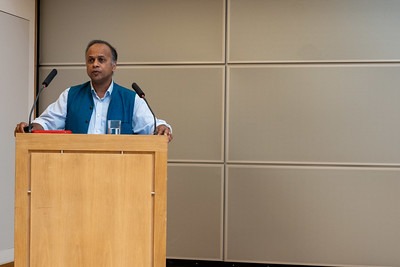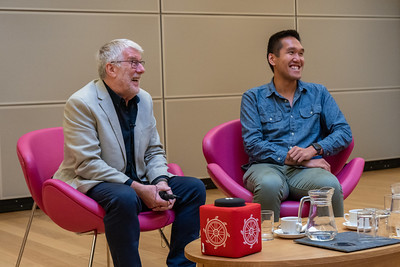
The Gates Cambridge Alumni Weekend included a lecture on overconsumption and talk about the future of Gates Cambridge.
We need contraction at the top.
Professor Bhaskar Vira
The wealthiest in the world need to reduce their over-consumption in order for climate change goals to be met and for the sustainability of the planet, Professor Bhaskar Vira told a gathering of Gates Cambridge alumni at the weekend.
Professor Vira, a Gates Cambridge Trustee and soon to be Pro Vice Chancellor for Education as well as Head of the Department of Geography at the University of Cambridge, was giving the annual Lauren Zeitels Memorial Lecture at the Gates Cambridge Alumni Weekend which was attended by 32 alumni and 12 scholars from 19 countries.
Professor Vira spoke of the decline in species since the beginning of the industrial revolution and the threat to biodiversity and the sustainability of the planet brought as a result of the Anthropocene. He showed figures for Earth Overshoot Day – the time of the year when a country consumes a year’s worth of resources. This highlighted which countries are the worst when it comes to overconsumption of the world’s resources, with Australia at the top, followed by the USA. The figures show that we need on average 1.7 Earths to produce the resources that we currently consume, but that some countries consume much more than others. Meanwhile, some populations within countries consume more than others.
 Professor Vira said Oxfam research shows that the world’s richest 1% consume at a rate that is 30 times higher than the level needed to keep global warming to the internationally agreed 1.5 degree goal. He said countries were not necessarily the right unit through which to measure inequality, given the gaps between different groups within countries, including intergenerational gaps. “We need contraction at the top,” he said, adding that the challenges of climate change need to be dealt with through interdisciplinary collaboration. He cited research combining economics and environmental expertise which argued for more investment in nature, but he added that decisions to limit consumption should not solely be based on economics. He said there is a strong moral case to protect nature and not to outsource our obligations to others, for instance, by paying countries in the Global South to plant forests to make up for pollution in the North.
Professor Vira said Oxfam research shows that the world’s richest 1% consume at a rate that is 30 times higher than the level needed to keep global warming to the internationally agreed 1.5 degree goal. He said countries were not necessarily the right unit through which to measure inequality, given the gaps between different groups within countries, including intergenerational gaps. “We need contraction at the top,” he said, adding that the challenges of climate change need to be dealt with through interdisciplinary collaboration. He cited research combining economics and environmental expertise which argued for more investment in nature, but he added that decisions to limit consumption should not solely be based on economics. He said there is a strong moral case to protect nature and not to outsource our obligations to others, for instance, by paying countries in the Global South to plant forests to make up for pollution in the North.
Professor Vira asked why some decisions are more moral than others, for instance, universal suffrage, and don’t require economic justification and he spoke of the need to take the argument out of the academy to a wider audience.
He also spoke about the need for greater diversity of knowledge sharing and better understanding of the context in which decisions are taken, for instance, he said calls for a bushmeat ban in the wake of Covid and fears about zoonotic disease ignored the fact that bushmeat is the main source of protein for some communities and would increase their food insecurity.
Instead he said there should be respect for different knowledge systems. Diversity and mutual respect is also important within the Gates Cambridge Trust, said Professor Vira. He has been leading a Gates Cambridge task force on diversity, equity and inclusion with scholars, alumni and other university representatives. He explained that students have to be admitted by the university before they can be put forward for a Gates Cambridge Scholarship so it is the university’s admissions policies where work on diversity and inclusion needs to be focused. Their current focus is on UK postgraduates where it is easier to find contextual data on social disadvantage. Each country has its own particular issues when it comes to social disadvantage, he added.
He would like to see a wider participant pool, an improvement in the contextualised selection process with more understanding of the different contexts students are coming from and an enhanced scholar experience.
He mentioned his department’s work with the Posse Foundation in the US which targets and supports disadvantaged students and he said the Chemistry Department has piloted a supplementary questionnaire for applicants which seeks more information on any disadvantages they may have faced. However, he admitted this was not without its challenges.
In conversation with Barry Everitt
The lecture followed an alumni panel on the war in Ukraine and an in-conversation talk between Alex Kong [2016], former co-chair of the Gates Cambridge Alumni Association, and Professor Barry Everitt, who leaves his post as Gates Cambridge Provost this year. Professor Everitt spoke of how much he had enjoyed being Provost and of the main achievements of his tenure.
 They included evolving and refining the selection mechanism for new scholars, including recruiting academics from across the University and in the US who are committed to and understand the challenges of postgraduate education, as well as increasing the number of alumni involved. He had also tackled the University-wide problem that the great majority of PhD students do not complete their research and theses in three years and require funding through a fourth year. He was very pleased that Trustees agreed his proposal to fund Gates Scholars for a full four years. Other achievements included supporting the development of the Gates Cambridge Alumni Association and securing a new home for the Trust and Gates Cambridge Scholars Common Room.
They included evolving and refining the selection mechanism for new scholars, including recruiting academics from across the University and in the US who are committed to and understand the challenges of postgraduate education, as well as increasing the number of alumni involved. He had also tackled the University-wide problem that the great majority of PhD students do not complete their research and theses in three years and require funding through a fourth year. He was very pleased that Trustees agreed his proposal to fund Gates Scholars for a full four years. Other achievements included supporting the development of the Gates Cambridge Alumni Association and securing a new home for the Trust and Gates Cambridge Scholars Common Room.
Professor Everitt spoke of his own life and intellectual development: how he had grown up in Dagenham in Essex and was the first in his family to go to university, how his academic career progressed from zoology to neuroendocrinology to neuroscience and he had moved from Hull University to Birmingham University and then to Stockholm and finally to Cambridge where he developed his own laboratory focusing on the behavioural neuroscience of learning, memory and motivation in particular relation to drug addiction. He described securing an academic career at Cambridge as being “like dying and going to heaven”: he had the freedom to pursue his research, having always secured funding from the Medical Research Council to do so, and also the pleasure of teaching incredibly bright students. Professor Everitt, who was until recently Master of Downing College, also commented on the damaging impact of Brexit on UK research.
In terms of unfinished business, he said he would like to see the number of scholarships awarded each year increase to 100 to be able to reach the maximum number of potential scholars across all countries, thereby further increasing diversity and the creation of a Gates Cambridge postdoctoral fellowship scheme to act as a bridge between a PhD and the first academic or other post in a scholar’s home or other country.
*Picture credit: Westfield London shopping centre by Tiia Monto courtesy of wikimedia commons.












